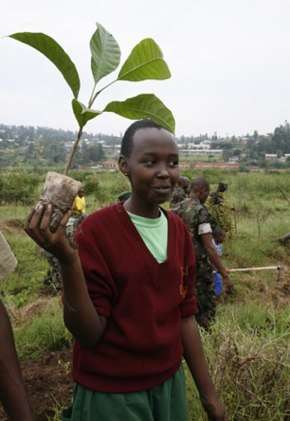Rwanda won a United Nations-backed gold award for its forest promotion policies, an event that former US track and field star Carl Lewis, a nine-time Olympic gold winner, called more important than any athletic medals he garnered.
Policies from the US and Gambia were runners-up, beating out entries from 20 countries to win joint silvers in the Future Policy Awards for forestry, announced this week by the World Future Council.
Despite continuing population and land pressures, Rwanda has achieved a major reversal of its trend of declining forest cover and is on course to reach its goal of increasing forests to 30% of total land area.
Forest cover has already increased by 37% since 1990. Massive reforestation and planting activities to promote indigenous species and involve the local population were undertaken, along with new agro-forestry and forest management education.
"Exemplary policy solutions do exist. The Future Policy Award celebrates the best of them," says Alexandra Wandel, Director of the World Future Council.
Rwanda has also taken a lead in bio-diversity conservation, ecotourism and green jobs. The country of 11.4 million people has also been a pioneer in banning plastic bags: in 2008 a bill was introduced to prohibit the manufacture, import, use and sale of polythene bags in the country.
The first Silver Award went to The Gambia's Community Forest Policy, which has achieved sustainable forest management and poverty alleviation by handing control of forests to the communities that use them.
"The success of the Gambia's Community Forest Policy proves that even in the world's poorest countries, with the right policies and legal framework in place, rural populations can benefit economically from forests and significantly improve their food security and environment," said an official of the UN Food and Agriculture Organization.
The second Silver Award went to the US Lacey Act amendment of 2008 which prohibits all trade in wood and plant products that are knowingly illegally sourced from a US state or any foreign country.
The World Future Council is a group of 50 respected leaders from all five continents representing governments, parliaments, the arts, civil society, science and business world.










Be the first to comment